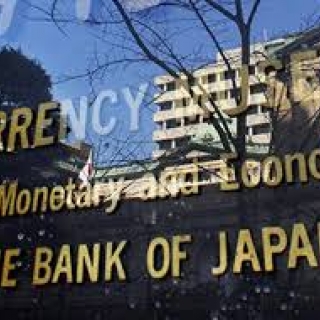


The Bank of Japan (BoJ) is widely expected to leave short-term interest rates unchanged at 0.5% after its two-day June monetary policy review ends on Tuesday (6/17).
With no quarterly economic projections due, all eyes will be on the BoJ's plan to taper its purchases of Japanese government bonds (JGBs) and hints on the timing of its next rate hike. The BoJ's policy announcement is likely to fuel volatility around the Japanese yen (JPY).
What to expect from the BoJ's rate decision?
The BoJ is set to extend the pause in its rate-hike cycle to a third straight month in June, keeping its polic rate at its highest level in 17 years.
At its April 30-May 1 policy meeting, the Bank of Japan stuck to its rhetoric that it "will continue to raise interest rates if the economy and prices move in line with expectations."
The bank also pointed to a more volatile outlook due to U.S. trade policy: "Uncertainty about the impact of tariffs on the economy remains high even after tariffs are finalized."
Since then, trade tensions have eased, thanks to a US-China truce and the prospect of US trade deals with Japan and the European Union (EU).
"If trade negotiations between the countries continue and uncertainties over trade policies ease, overseas economies will resume a moderate growth path. That, in turn, will accelerate Japan's economic growth," Ueda said in a speech earlier this month, keeping alive hopes for another rate hike by year-end.
As such, markets expect BOJ chief Ueda to lean slightly hawkish when he talks about the rate outlook during his post-policy meeting press conference at 6:30 GMT.
In addition, concerns over stubborn food inflation, particularly due to rising costs of Japan's staple rice, could prompt Ueda to deliver a hawkish message.
"Japan is now experiencing a second wave of food price inflation driven by supply shocks, which are adding to the inflationary momentum from higher wages," Ueda said previously.
Japan's core consumer price index (CPI) inflation has exceeded the BoJ's 2% target for more than three years and hit a more than two-year high of 3.5% in April, driven largely by a 7% jump in food prices, according to Reuters.
In addition to the BoJ's communication on its next interest rate move, markets will also be watching the central bank's assessment of its current plan to reduce the bank's JGB holdings by JPY400 billion per quarter.
The BoJ is considering halving the pace of quarterly reductions in JGB purchases to JPY200 billion ($1.4 billion) starting in April 2026, according to a report by the Nikkei Asian Review on Saturday.
The BoJ's tapering plan is expected to be supported by a majority of policy board members, the Nikkei added.
The potential for a reduction in the central bank's stimulus tapering plan remains important given the recent volatility in the bond market, when the 40-year JGB yield hit an all-time high. (alg)
Source: FXstreet
US bonds fell after jobless claims fell to their lowest level since 2022, one of the last readings on the health of the US labor market before the Federal Reserve's interest rate decision next week. ...
According to a report from the US Department of Labour (DOL) released on Thursday, the number of US citizens submitting new applications for unemployment insurance went down to 191K for the week endin...
Treasury Secretary Scott Bessent on Wednesday predicted that the administration still will be able to implement its tariff agenda regardless of whether it prevails in a pending case before the Supreme...
Private businesses in the US cut 32K jobs in November 2025, following an upwardly revised 47K gain in October, and compared to forecasts of a 10K rise. Hiring was particularly weak in manufacturing (...
Ekonom terkenal Scott Bessent memprediksi bahwa Amerika Serikat kemungkinan akan mengalami pertumbuhan ekonomi yang kuat namun inflasi tetap rendah pada 2026. Menurut Bessent, faktor seperti harga ene...
US stocks closed higher on Friday (December 5), with the S&P 500 up 0.2%, the Nasdaq up 0.4%, and the Dow Jones Industrial Average up 0.2% as weak PCE data and positive sentiment in Michigan strengthened the likelihood of a 25bps Fed rate cut...
Oil prices edged up nearly 1% to a two-week high on Friday (December 5th) amid growing expectations that the US Federal Reserve will cut interest rates next week, which could boost economic growth and energy demand, as well as geopolitical...
Gold closed around $4,210 an ounce on Friday, near its highest level since late October, paring an earlier rally as a series of US data strengthened the case for an imminent Fed rate cut. Delayed September PCE rose 0.3% month-on-month and 2.8%...
 Private businesses in the US cut 32K jobs in November 2025, following an upwardly revised 47K gain in October, and compared to forecasts of a 10K...
Private businesses in the US cut 32K jobs in November 2025, following an upwardly revised 47K gain in October, and compared to forecasts of a 10K...
 Asia-Pacific stock markets opened lower on Friday, following the sluggish sentiment on Wall Street. In Australia, the ASX/S&P 200 fell 0.17%. In...
Asia-Pacific stock markets opened lower on Friday, following the sluggish sentiment on Wall Street. In Australia, the ASX/S&P 200 fell 0.17%. In...
 European stocks closed higher on Thursday (December 2nd), supported by a rebound in shares of major banks and automakers. The Eurozone STOXX 50 and...
European stocks closed higher on Thursday (December 2nd), supported by a rebound in shares of major banks and automakers. The Eurozone STOXX 50 and...
 According to a report from the US Department of Labour (DOL) released on Thursday, the number of US citizens submitting new applications for...
According to a report from the US Department of Labour (DOL) released on Thursday, the number of US citizens submitting new applications for...